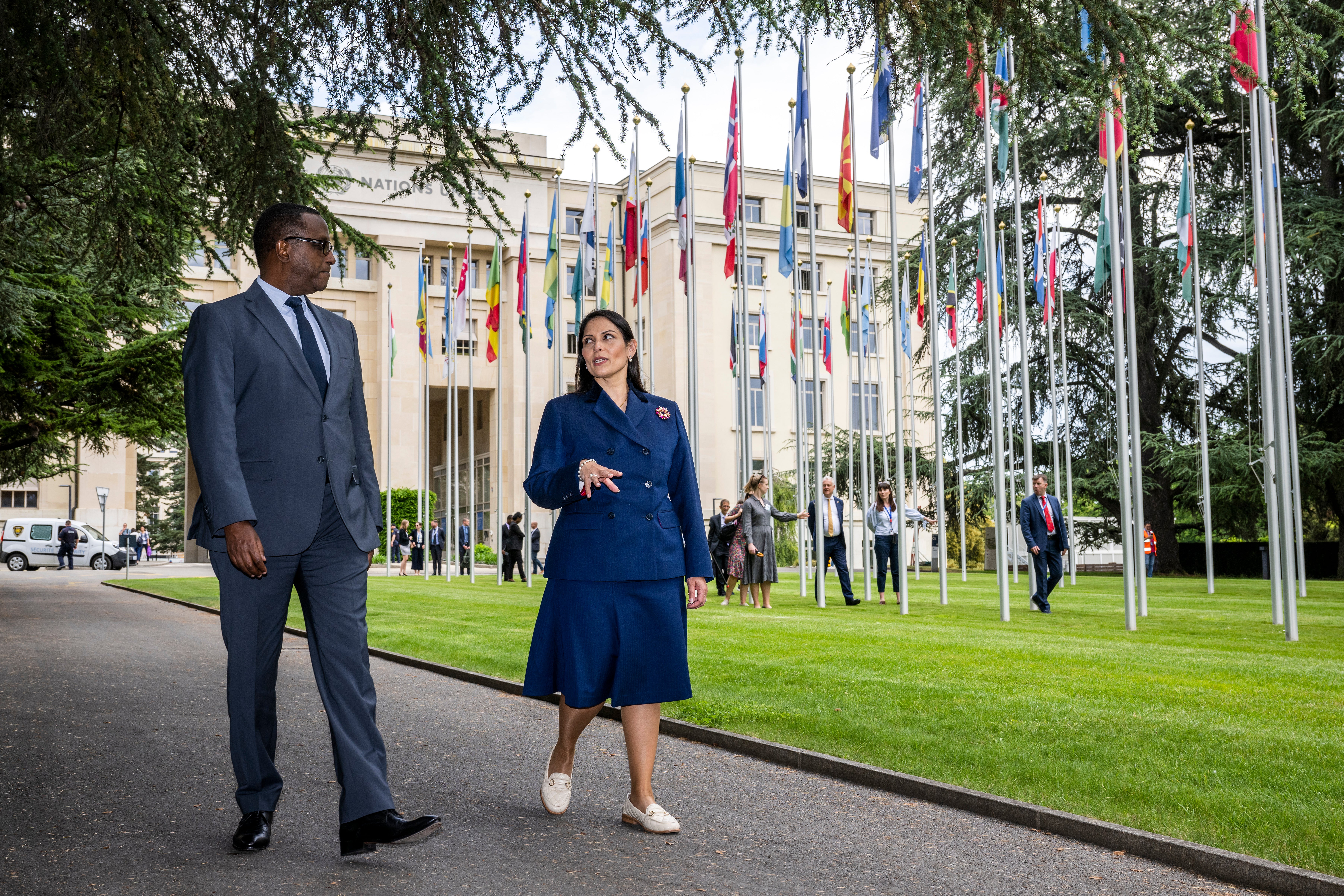First Rwanda deportation flight set for next month as asylum seekers to be given final notice
Priti Patel says she will not be deterred by ‘attempts to frustrate’ removal process
Your support helps us to tell the story
From reproductive rights to climate change to Big Tech, The Independent is on the ground when the story is developing. Whether it's investigating the financials of Elon Musk's pro-Trump PAC or producing our latest documentary, 'The A Word', which shines a light on the American women fighting for reproductive rights, we know how important it is to parse out the facts from the messaging.
At such a critical moment in US history, we need reporters on the ground. Your donation allows us to keep sending journalists to speak to both sides of the story.
The Independent is trusted by Americans across the entire political spectrum. And unlike many other quality news outlets, we choose not to lock Americans out of our reporting and analysis with paywalls. We believe quality journalism should be available to everyone, paid for by those who can afford it.
Your support makes all the difference.The first flight to Rwanda carrying asylum seekers denied entry to the UK is scheduled to leave next month, the Home Office said.
Officials have started giving final notice to the first group of people to be sent the east African nation under the controversial new deportation scheme – which has been described as “irrational” and “unlawful” by campaigners.
The Home Office is understood to have informed dozens of people earlier in May that they were being considered for removal and is now handing out Removal Direction notices. The ministry said officials were working to ensure individuals are given the “appropriate support” ahead of departure.
According to the Joint Council for the Welfare of Immigrants, more than a dozen Syrian refugees are among those who have been told they will be deported.
The first flight has been set for 14 June, although it is unclear if all those handed notices will be onboard. The removal notices are the last administrative hurdle to the deportations but people who receive them can challenge them in court.
“While we know attempts will now be made to frustrate the process and delay removals, I will not be deterred and remain fully committed to delivering what the British public expect,” the home secretary, Priti Patel said.
Several organisations threatening to take the Home Office to court over the removal policy. Sonya Sceats, chief executive of Freedom from Torture, a charity that is challenging the policy in court, said: “Given serious legal questions still awaiting judicial scrutiny, this announcement looks like political grandstanding by a prime minister desperate to divert the public from speculation about his fitness to lead our country.
“We welcome the strong public support for our plans to challenge this neo-colonial ‘cash for humans’ scheme and ensure the UK is a safe place for people fleeing torture and persecution.”
Bella Sankey, director of Detention Action, one of the organisations threatening legal action against the plan, said: “What a way to mark the Platinum Jubilee weekend, by telling torture and slavery survivors who have travelled thousands of miles to reach safety that they will be expelled to an oppressive dictatorship.”
Ms Patel announced in April what she claimed as a “world-leading” scheme with the Rwandan government that had been agreed at an up-front cost to Britain of £120m. Under the agreement, asylum seekers will be sent to Rwanda for their claims to be processed and, if successful, will be eligible to settle there. Those with failed bids will be offered the chance to apply for visas under other immigration routes if they wish to remain in Rwanda, but could still face deportation.
“Our world-leading partnership with Rwanda is a key part of our strategy to overhaul the broken asylum system and break the evil people smugglers’ business model,” Ms Patel said.

Boris Johnson has previously said tens of thousands of people could be flown to Rwanda under the scheme but the deputy prime minister, Dominic Raab, has suggested that number is “more likely to be in the hundreds”.
Home Office guidance states the new route should be considered for asylum seekers who are deemed “inadmissible” for consideration in the UK, and arrived by a small boat or via what the government calls a “dangerous” or “illegal” method after 1 January. That includes people who arrive on small boats and have a connection to another safe country that is not the UK or their home nation.
Connections include having been recognised as a refugee in, travelled through or made an asylum application to a country, according to examples in the Home Office guidance. Or that an application could have been made to that country “on the balance of probabilities”. Having “spent a couple of weeks in Brussels staying with friends” could potentially meet this criteria.
The UN Refugee Agency (UNHCR) has spoken out against the removal policy, saying it “evades international obligations and is contrary to the letter and spirit of the Refugee Convention”.
UNHRC officials said there is no international legal obligation requiring refugees to seek asylum in the “first safe country they reach”, which is a key assertion underpinning the government’s policies.
In the guidance – which was made public on threat of legal action from refugee charities – the Home Office also said Rwanda is “a safe country to relocate people to”, although an assessment carried out before the agreement found “some concerns with its human rights record around political opposition to the current regime, dissent and free speech”.

Join our commenting forum
Join thought-provoking conversations, follow other Independent readers and see their replies
Comments